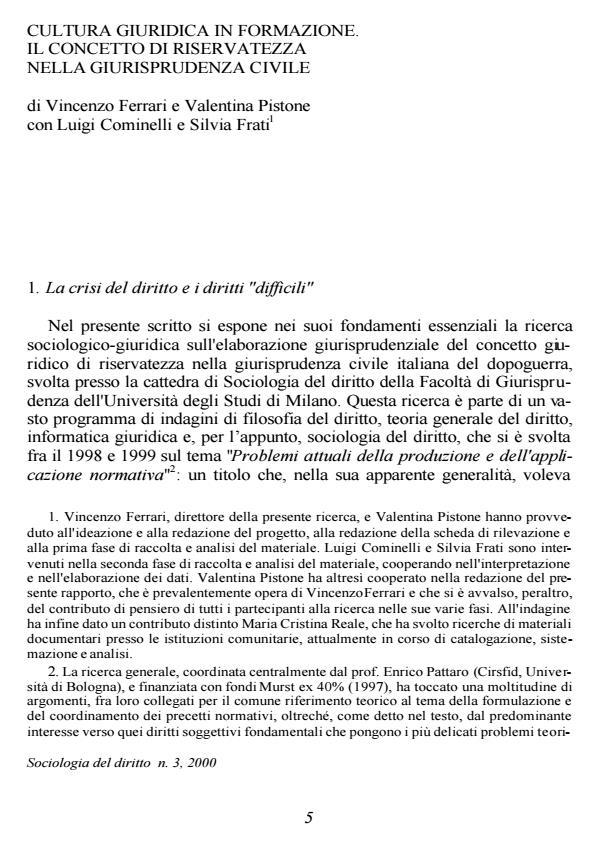Cultura giuridica in formazione. Il concetto di riservatezza nella giurisprudenza civile
Titolo Rivista SOCIOLOGIA DEL DIRITTO
Autori/Curatori Vincenzo Ferrari, Valentina Pistone (con Luigi Cominelli, Silvia Frati)
Anno di pubblicazione 1 Fascicolo 2000/3
Lingua Italiano Numero pagine 47 P. Dimensione file 174 KB
DOI
Il DOI è il codice a barre della proprietà intellettuale: per saperne di più
clicca qui
Qui sotto puoi vedere in anteprima la prima pagina di questo articolo.
Se questo articolo ti interessa, lo puoi acquistare (e scaricare in formato pdf) seguendo le facili indicazioni per acquistare il download credit. Acquista Download Credits per scaricare questo Articolo in formato PDF

FrancoAngeli è membro della Publishers International Linking Association, Inc (PILA), associazione indipendente e non profit per facilitare (attraverso i servizi tecnologici implementati da CrossRef.org) l’accesso degli studiosi ai contenuti digitali nelle pubblicazioni professionali e scientifiche.
In the Italian legal system, characterised by an overwhelming amount of statute law, the privacy question represents an exception, since the Parliament waited until the end of 1996 before passing an Act addressed to protecting "personal data", especially with regard to misuse through computerised technologies. In contrast to the legislators' lengthy silence, a legal concept of privacy has developed in the course of the last forty years, on the basis of both doctrinal writing and case law. The research referred to in this essay, a part of an interdisciplinary inquiry into the crisis of the certainty of law, describes the findings gathered through a content analysis of a large sample of precedents, covering almost all relevant published judicial decisions issued by the Italian courts of all instances between 1953 and 1996. The main purpose of the research team was to understand how legal culture, both "external" and "internal", as Lawrence Friedman defined it, contributed to constructing a viable legal notion of privacy. Four sets of variables were considered: a) "the structure of the fact", b) "the structure of the judicial proceedings", c) "the structure of the judicial decision" and d) "the structure of judicial reasoning". The panorama offered reveals that the protection of privacy has been mostly the result of conflicts concerning the "visual" image of known persons, most often VIPs, or the historical reconstruction in movies of events that had caught the imagination of public opinion, such as famous love stories or celebrated crimes. Reacting to cases of this kind, Courts granted or denied legal protection on a largely unequal and dis-cretionary basis, though making use of analogy or presenting their decisions as the logical consequence of "universal" principles, such as those stated in the European Convention on Human Rights. As a result, the very concept of privacy, though tackled remarkably in a number of decisions which often reflected conspicuous doctrinal achievements, has long remained as a whole quite obscure, undefined and basically separate from the core of discussions meanwhile being conducted in other European countries.
Vincenzo Ferrari, Valentina Pistone (con Luigi Cominelli, Silvia Frati), Cultura giuridica in formazione. Il concetto di riservatezza nella giurisprudenza civile in "SOCIOLOGIA DEL DIRITTO " 3/2000, pp , DOI: